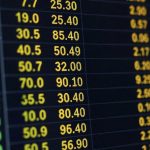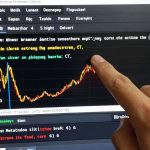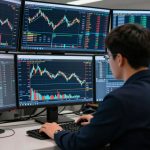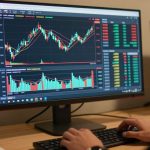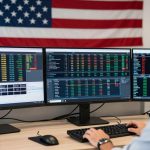Picking the right brokerage for currency trading can feel like a big deal, especially with all the options out there. This guide is here to help you figure out what really matters when you’re looking for a brokerage for currency trading in 2025. We’ll go over the important stuff like how to pick a good one, what the top places are, and how to make sure your money is safe. It’s about finding a brokerage for currency trading that fits what you need, whether you’re just starting or you’ve been doing this for a while.
Key Takeaways
- Always check a brokerage for currency trading’s rules and who watches over them to make sure they are real.
- Look at all the fees, like what you pay to trade and any other charges, when picking a brokerage for currency trading.
- A good trading platform and useful tools from your brokerage for currency trading can make a big difference in how you trade.
- Think about what kind of trader you are, like if you’re new or experienced, to find the best brokerage for currency trading for you.
- Good customer help and learning materials from a brokerage for currency trading can be super helpful, especially if you run into problems.
Understanding Brokerage for Currency Trading
Key Factors for Selecting a Brokerage
Choosing a brokerage for currency trading can feel like a big decision. There are a lot of things to think about! One of the most important things is to find a brokerage that fits your specific needs and trading style.
Here’s a quick rundown of some key factors:
- Regulation: Is the brokerage regulated by a reputable authority? This helps ensure your funds are safe.
- Trading Platform: Is the platform user-friendly and does it offer the tools you need?
- Fees and Spreads: What are the costs associated with trading? Look closely at spreads, commissions, and any hidden fees.
- Currency Pairs: Does the brokerage offer the currency pairs you want to trade?
- Customer Support: Is customer support responsive and helpful?
It’s easy to get overwhelmed by all the options, but taking the time to research and compare brokerages is worth it. Don’t rush into anything. Start with a demo account to get a feel for the platform and the market before risking real money.
Regulatory Oversight in Currency Trading
Regulatory oversight is super important in currency trading. It’s what helps protect traders from fraud and ensures fair practices. In the U.S., the Commodity Futures Trading Commission (CFTC) and the National Futures Association (NFA) are the main regulatory bodies. These agencies set rules and monitor forex brokers to make sure they’re following them. Brokers operating legally in the U.S. must register with these agencies and meet certain financial requirements. For example, they need to maintain a minimum net capital. Some brokers that are legally available to retail clients in the U.S. include tastyfx, FOREX.com and OANDA.
Evaluating Trading Platforms and Tools
The trading platform is where you’ll spend most of your time, so it’s important to choose one that you like. A good platform should be easy to use, reliable, and offer the tools you need to analyze the market and execute trades. Look for features like:
- Real-time charts: These help you track price movements.
- Technical indicators: These can provide insights into potential trading opportunities.
- Order types: Different order types (market orders, limit orders, stop-loss orders) allow you to manage risk.
- Mobile trading: The ability to trade on the go is a big plus for many traders.
Some platforms also offer advanced features like automated trading capabilities and access to news and research. Consider what’s important to you and choose a platform that meets your needs. Don’t be afraid to try out a few different platforms before making a decision. Many brokers offer demo accounts that allow you to test the platform without risking real money. Also, make sure you understand how to calculate an exchange rate before you start trading.
Top Brokerages for Currency Trading in 2025
Okay, so you’re looking for the best places to trade currency in 2025? It’s a jungle out there, but some brokers consistently rise to the top. Let’s break down some of the leading contenders, what makes them stand out, and how to pick the right one for you. It’s not just about the big names; sometimes, a specialized broker can be a better fit, depending on your needs.
Leading US Brokerages for Currency Trading
When it comes to US-based brokerages, you’ve got a few solid options. These guys are generally well-regulated and offer a decent range of features.
- OANDA is often mentioned for its straightforward platform and regulatory compliance. If you’re just starting, their platform is pretty easy to get the hang of. Plus, they’re regulated, which gives you some peace of mind. OANDA Trade platform is a good place to start.
- Interactive Brokers is another big player. They’re known for their wide range of offerings and competitive pricing, especially if you’re trading larger volumes. Their platform can be a bit overwhelming at first, but it’s powerful once you get used to it.
- FOREX.com is, well, pretty self-explanatory. They focus on currency trading and usually have a good selection of currency pairs to trade. Their research tools are also worth checking out.
Brokerage for Currency Trading: Overall Ratings
Ratings can be helpful, but don’t take them as gospel. Different sites use different criteria, so it’s good to look at a few different sources. Here’s a general idea of what to look for:
- Platform and Tools: How easy is the platform to use? Does it have the charting tools and indicators you need?
- Pricing: What are the spreads and commissions like? Are there any hidden fees?
- Customer Service: How responsive and helpful is the customer support team?
- Regulation: Is the broker regulated by a reputable authority?
- Range of Markets: Does the broker offer the currency pairs you want to trade?
Specialized Brokerages for Currency Trading
Sometimes, a general brokerage just doesn’t cut it. If you have specific needs, a specialized broker might be a better choice. For example:
- If you’re into social trading, where you copy the trades of other successful traders, eToro might be worth a look.
- If you’re looking for very tight spreads, some ECN brokers might be a good fit, but keep in mind they often charge commissions.
- If you need advanced charting and analysis tools, some brokers cater specifically to technical traders.
Choosing a brokerage is a personal decision. What works for one trader might not work for another. Take your time, do your research, and don’t be afraid to try out a few different platforms before settling on one. Consider your trading style, risk tolerance, and capital before making a decision. Good luck!
Cost Considerations for Currency Trading

Analyzing Spreads and Commissions
When you’re picking a brokerage for currency trading, it’s easy to get laser-focused on the big picture stuff, like platform features or research tools. But let’s be real, the costs can seriously eat into your profits if you’re not careful. Spreads and commissions are the two main ways brokers make money, so understanding them is key.
- Spreads: This is the difference between the buy (ask) and sell (bid) price of a currency pair. A tighter spread means you’re getting a better deal.
- Commissions: Some brokers charge a flat fee or a percentage of the trade size. It’s important to compare commission structures, especially if you’re a high-volume trader.
- Hybrid Models: Some brokers offer a mix of both – wider spreads with no commissions, or tighter spreads with a commission on top. You need to figure out which model works best for your trading style.
Understanding Inactivity and Custody Fees
Beyond the obvious costs, there are sneaky fees that can catch you off guard. Inactivity fees are charged if you don’t trade for a certain period. Custody fees are less common, but some brokers might charge them for holding your funds. Always read the fine print to avoid surprises.
Here’s a quick rundown of potential hidden fees:
- Inactivity Fees: Charged if you don’t trade for a specified period (e.g., 3 months).
- Withdrawal Fees: Some brokers charge fees for withdrawing your money.
- Overnight Financing Costs: Also known as swap fees, these are charged for holding positions overnight.
It’s easy to overlook these smaller fees, but they can add up over time, especially if you’re not an active trader or if you tend to hold positions for longer periods. Make sure you factor these into your overall cost analysis when choosing a broker.
Minimum Deposit Requirements for Brokerage for Currency Trading
Most brokers require a minimum deposit to open an account. This can range from a few dollars to several thousand, depending on the broker and the type of account. Don’t just pick the broker with the lowest minimum deposit, though. Consider the overall value they offer, including platform features, research tools, and customer support. A higher minimum deposit might be worth it if you’re getting a better overall experience.
Here’s what to consider about minimum deposits:
- Account Type: Different account types (e.g., standard, premium, VIP) often have different minimum deposit requirements.
- Broker Reputation: Established brokers with more features might require higher minimum deposits.
- Trading Goals: If you’re just starting out, a lower minimum deposit might be preferable, but as you grow, you might want to consider brokers with higher requirements and more advanced features.
| Broker | Minimum Deposit |
|---|---|
| FOREX.com | $100 |
| tastyfx | $100 |
| Saxo | $0 |
Advanced Features in Brokerage for Currency Trading
Currency trading has evolved, and brokerages now provide a range of advanced features to cater to sophisticated traders. These tools and capabilities can significantly impact a trader’s ability to analyze markets, automate strategies, and execute trades efficiently. Let’s explore some of these key features.
Leveraging Advanced Trading Tools
Advanced trading tools are essential for traders who need in-depth analysis and precise execution. These tools go beyond basic charting and order entry, offering functionalities like:
- Depth of Market (DOM): Shows the range of buy and sell orders for a currency pair, providing insights into potential support and resistance levels.
- One-Click Trading: Allows traders to execute orders with a single click, crucial for fast-moving markets.
- Customizable Charting: Offers a wide array of technical indicators, drawing tools, and timeframes to tailor charts to individual trading styles. Charles Schwab, for example, provides powerful charting and analysis capabilities through thinkScripts.
Having access to these tools can make a big difference. It’s like having a super-powered calculator when everyone else is stuck with basic arithmetic. The more information you have, the better decisions you can make.
Exploring Automated Trading Capabilities
Automated trading, also known as algorithmic trading, involves using computer programs to execute trades based on predefined rules. This can be a game-changer for traders who want to remove emotion from their trading and capitalize on opportunities 24/7. Here’s what to look for:
- Strategy Builders: User-friendly interfaces that allow traders to create automated strategies without coding knowledge.
- Backtesting: The ability to test strategies on historical data to evaluate their performance.
- API Access: For experienced programmers, API access allows for the development of custom trading robots. Institutional forex participants and exchanges often use APIs to connect their systems directly to the brokerage.
Accessing Comprehensive Research and Analytics
Informed trading decisions require access to high-quality research and analytics. Brokerages that provide comprehensive resources can give traders a significant edge. Look for:
- Real-Time News Feeds: Up-to-the-minute news and analysis from reputable sources.
- Economic Calendars: Track upcoming economic events and their potential impact on currency prices.
- Analyst Reports: Insights and recommendations from experienced market analysts. A good forex broker will include resources to support traders.
Here’s a quick comparison of research resources offered by different brokerages:
| Brokerage | News Feeds | Economic Calendar | Analyst Reports |
|---|---|---|---|
| Brokerage A | Yes | Yes | Yes |
| Brokerage B | Yes | Yes | No |
| Brokerage C | No | Yes | No |
Choosing a brokerage with robust advanced features can significantly improve your trading performance. Consider your trading style and needs when evaluating these features to find the best fit.
Choosing a Brokerage for Currency Trading Based on Trading Style
It’s important to pick a brokerage for currency trading that fits how you like to trade. What works for a beginner won’t necessarily work for someone who’s been trading for years, or for someone who trades all day long. Let’s look at some different trading styles and the brokerages that might be a good fit.
Brokerages for Beginner Currency Traders
Starting out in currency trading can be overwhelming. You need a platform that’s easy to use, has good educational resources, and doesn’t require a ton of money to get started. Here’s what to look for:
- User-Friendly Platform: A simple, intuitive interface is key. You don’t want to get bogged down in complicated charts and tools when you’re just learning the ropes.
- Educational Resources: Look for brokerages that offer tutorials, webinars, and demo accounts. These can help you learn the basics without risking real money.
- Low Minimum Deposits: Some brokerages require hefty minimum deposits, which can be a barrier for beginners. Find one that lets you start with a smaller amount.
It’s a good idea to start with a demo account to get a feel for the platform and practice your trading strategies before putting real money on the line. Don’t rush into things, and take the time to learn the basics.
Brokerages for Experienced Currency Traders
If you’ve been trading currencies for a while, you probably have a good idea of what you need from a brokerage. You’re likely looking for advanced tools, competitive spreads, and the ability to customize your trading experience. Experienced traders often prioritize speed and efficiency.
- Advanced Charting Tools: Access to a wide range of technical indicators and charting options is essential for analyzing market trends.
- Customizable Platform: The ability to tailor the platform to your specific needs can greatly improve your trading efficiency.
- Competitive Spreads and Commissions: Even small differences in spreads and commissions can add up over time, so it’s important to find a brokerage that offers competitive pricing.
Brokerages for High-Frequency Currency Trading
High-frequency trading (HFT) involves making a large number of trades in a very short period of time. This requires a brokerage with ultra-fast execution speeds, low latency, and direct market access. Not all brokerages are equipped to handle HFT.
Here are some key considerations for HFT traders:
- Direct Market Access (DMA): DMA allows you to bypass the brokerage’s dealing desk and trade directly with the market, which can result in faster execution speeds.
- Low Latency: Latency refers to the delay between when you place an order and when it’s executed. In HFT, even milliseconds can make a difference.
- Co-location Services: Some brokerages offer co-location services, which means you can place your trading servers in the same data center as the brokerage’s servers. This can further reduce latency.
Here’s a quick comparison table:
| Feature | Beginner Traders | Experienced Traders | High-Frequency Traders |
|---|---|---|---|
| Platform Ease | High | Medium | Low |
| Advanced Tools | Low | High | High |
| Execution Speed | Medium | Medium | Very High |
| Commission | Important | Very Important | Crucial |
| Minimum Deposit | Low | Medium | High |
Security and Trust in Brokerage for Currency Trading
It’s easy to get caught up in the excitement of currency trading, but security should always be your top priority. You’re trusting these brokerages with your money, so you need to know they’re reliable and trustworthy. Let’s break down what to look for.
Assessing Brokerage Regulatory Compliance
Regulatory compliance is non-negotiable. A trustworthy brokerage should be registered with a reputable regulatory body. In the U.S., that’s the Commodity Futures Trading Commission (CFTC) and membership in the National Futures Association (NFA). These organizations keep an eye on things and help protect traders from fraud and scams. If a brokerage isn’t registered, that’s a huge red flag. It’s also worth checking if they’re regulated in other major financial centers, like the UK’s Financial Conduct Authority (FCA) or the Australian Securities and Investments Commission (ASIC). These regulations ensure forex brokers adhere to strict financial standards.
Understanding Fund Protection Measures
What happens to your money if the brokerage goes belly up? That’s where fund protection measures come in. Look for brokerages that offer segregated accounts, meaning your funds are kept separate from the brokerage’s operating funds. This makes it harder for your money to be used to cover the brokerage’s debts. Also, check if the brokerage participates in any compensation schemes, like the Financial Services Compensation Scheme (FSCS) in the UK. These schemes can provide some level of compensation if the brokerage becomes insolvent. Here’s a quick rundown of what to look for:
- Segregated accounts: Your money is kept separate.
- Compensation schemes: Protection in case of brokerage failure.
- Audits: Regular checks to ensure financial stability.
It’s important to remember that no system is foolproof. Fund protection measures are designed to mitigate risk, but they don’t eliminate it entirely. Always do your own research and understand the risks involved before entrusting your money to any brokerage.
Evaluating Brokerage Reputation and Longevity
How long has the brokerage been around? What do other traders say about them? These are important questions to ask when evaluating a brokerage’s reputation. Look for brokerages with a long track record of stability and customer satisfaction. Read online reviews, check forums, and see what other traders are saying. Be wary of brokerages with a lot of negative reviews or a history of regulatory issues. Longevity in the market can be a good sign, but it’s not a guarantee of trustworthiness. Always do your own due diligence and don’t rely solely on a brokerage’s age or marketing materials. A good reputation and long history often indicate reliable currency trading services.
Customer Support and Educational Resources

It’s easy to overlook customer support and educational resources when you’re picking a brokerage, but trust me, you shouldn’t. These things can make or break your trading experience, especially if you’re just starting out. Let’s get into what to look for.
Quality of Customer Service for Currency Trading
Okay, so picture this: you’re in the middle of a trade, and something goes wrong. Maybe the platform freezes, or you can’t figure out how to close a position. That’s when good customer service becomes a lifesaver. You want a brokerage that offers multiple ways to get in touch – phone, email, live chat – and one that actually responds quickly. Look for brokers with 24/7 support, especially if you plan to trade currencies outside of regular business hours. Responsiveness is key, but so is the quality of the help you get. Are the support reps knowledgeable? Can they actually solve your problem, or do they just read from a script? Some things to consider:
- Response Time: How long does it take to get a reply?
- Availability: Is support available when you need it?
- Helpfulness: Does the support team actually solve your issues?
Availability of Educational Materials
Trading currencies can be complex, and having access to good educational materials can really help. I’m talking about more than just basic definitions. Look for brokerages that offer in-depth courses, webinars, and tutorials that cover everything from technical analysis to risk management. A good demo account is also a great way to practice without risking real money. IG is highly recognized for its educational content, having won the #1 Education award at the ForexBrokers.com 2025 Annual Awards, offering a wide range of learning materials. Here’s what to look for:
- Beginner Courses: Are there resources for people who are completely new to currency trading?
- Advanced Tutorials: Does the brokerage offer materials for more experienced traders?
- Webinars and Seminars: Are there live sessions where you can learn from experts?
Having access to a glossary of terms, economic calendars, and market analysis reports can also be super helpful. The more resources a brokerage provides, the better equipped you’ll be to make informed trading decisions.
Community and Forum Support for Traders
Trading can sometimes feel isolating, so it’s nice to have a community to turn to. Some brokerages host forums or online communities where traders can connect, share ideas, and ask questions. This can be a great way to learn from others and get different perspectives on the market. Plus, it’s just nice to know you’re not alone! Here are some things to consider:
- Active Forums: Are the forums active and engaging?
- Expert Moderation: Are the forums moderated by experienced traders or analysts?
- Networking Opportunities: Can you connect with other traders and build relationships?
Picking Your Broker for 2025
So, when it comes to picking a brokerage for currency trading in 2025, it’s really about what works for you. Think about what you need most: maybe it’s super low fees, or maybe you want a platform that’s really easy to use. Some people care a lot about having tons of research tools, while others just want something simple. Take your time, look at a few options, and don’t be afraid to try out a demo account if they offer one. The right choice will make your trading journey a lot smoother, and that’s what we’re all aiming for, right?
Frequently Asked Questions
What exactly is a currency trading brokerage?
A currency trading brokerage is like a special bank account for buying and selling different currencies. It gives you the tools and services you need to trade money from one country for money from another.
What are the most important things to look for in a currency trading brokerage?
When picking a brokerage, think about how much they charge (fees), how easy their trading platform is to use, if they have good customer support, and if they are regulated by a trusted government agency. Safety and cost are super important!
Is it important for a currency trading brokerage to be regulated?
Yes, it’s really important! Regulation means a government group watches over the brokerage to make sure they play fair and keep your money safe. This protects you from bad business practices.
What should I look for in a trading platform?
Trading platforms are the software or websites you use to make your trades. Good platforms are easy to understand, work fast, and have helpful tools like charts and news. They should also be stable and not crash often.
What kinds of fees should I expect when trading currencies?
Costs can include spreads (the difference between buying and selling prices), commissions (a fee for each trade), and sometimes fees if you don’t trade much or for keeping your money with them. Always check all the fees before you start!
How much money do I need to start trading currencies?
Many brokerages let you start with a small amount, sometimes as low as $50 or $100. However, having more money to start can give you more options and help you manage risks better.





